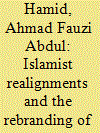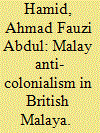|
|
|
Sort Order |
|
|
|
Items / Page
|
|
|
|
|
|
|
| Srl | Item |
| 1 |
ID:
119052


|
|
|
|
|
| Publication |
2013.
|
| Summary/Abstract |
This article discusses the role played by neo-conservative intellectuals during the tenure of Malaysia's fifth prime minister, Abdullah Ahmad Badawi (2003-2009). Abdullah's leadership was distinguished by two qualities which arguably qualify it as "neo-conservative," in terms of revival of policies from a bygone era and the launching of political reforms within the framework of a conservative regime led by the ruling United Malays National Organization (UMNO) party. Using the theoretical experiences of dominant conservative regimes in the Soviet Union, Japan, China and Taiwan, the present authors are of the view that the policies and approach undertaken by Abdullah constitute a sharp departure from those of his predecessor, Mahathir Mohamad, for twenty-two years (1981-2003). Particularly eliciting controversy was the trust Abdullah put into a team of young advisors led by his son-in-law, Khairy Jamaluddin. In this article, we look at how these young neo-conservative intellectuals, together with several identifiable individuals, brought about reforms in Abdullah's leadership and
impacted UMNO politics.
|
|
|
|
|
|
|
|
|
|
|
|
|
|
|
|
| 2 |
ID:
052492


|
|
|
| 3 |
ID:
083830


|
|
|
|
|
| Publication |
2008.
|
| Summary/Abstract |
This paper traces changing patterns of Islamism in Malaysia, focusing on developments during Dr Mahathir Mohamads final administration (1999-2003) and since Abdullah Ahmad Badawi assumed the premiership of the country on 31 October 2003. This period witnessed the making of a nascent Islamist civil society whose alliances have capriciously undergone realignments and reconfigurations in its endeavour to reach a stable equilibrium with non-Islamist forces. The emergence of a vibrant and burgeoning civil society in Malaysia has been characterized by lively vicissitudes in the relationship between its Islamist and non-Islamist elements. Having experienced a colourful and chequered relationship with the state and other Islamic movements since its official founding in 1971, the Muslim Youth Movement of Malaysia (ABIM: Angkatan Belia Islam Malaysia) has, since its leadership rejuvenation in 2005, attempted to reassert its dominant place as an influential and legitimate voice of the Malay-Muslim masses, but with mixed ramifications.
|
|
|
|
|
|
|
|
|
|
|
|
|
|
|
|
| 4 |
ID:
079477


|
|
|
|
|
| Publication |
2007.
|
| Summary/Abstract |
The debate which arose between the ruling United Malays National Organization (UMNO) and the opposition Democratic Action Party (DAP) in early September 2005, concerning the history of Malaysia's independence movement, necessitates a re-appraisal of the organizations and personalities involved. This article re-assesses the period and actors involved in bringing to fruition Malaysian independence. By utilizing mainly authoritative secondary sources, the reconstructed history belies the argument of the ruling elites that they inherit the mantle of `real independence fighters' from their political ancestors. Although the sources are readily available in Malaysian libraries, the truth contained in them has eluded the general public. Thus, to lay people, political history in Malaysia has been what ruling politicians tell them and what they find in school textbooks that, in any case, have been approved by the powers that be. This article reveals that pre-independence Malaysian history is replete with contradictions and paradoxes which may transform perceptions of who were and were not independence heroes.
|
|
|
|
|
|
|
|
|
|
|
|
|
|
|
|
| 5 |
ID:
116633


|
|
|
|
|
| Publication |
2012.
|
| Summary/Abstract |
This article argues that calls for the reassertion of royal power in Malaysia pre-dated the historic twelfth general elections of 2008. The erosion of UMNO's hegemony accelerated the revival of the monarchy. Ironically, an institution strongly identified with the feudal order found itself reinvigorated in an age of new politics.
|
|
|
|
|
|
|
|
|
|
|
|
|
|
|
|
| 6 |
ID:
143893


|
|
|
|
|
| Summary/Abstract |
Islam was officially installed as the religion of the Federation of Malaya upon independence on 31 August 1957, and retained as such after the formation of Malaysia on 16 September 1963. Since then, political stakeholders have not shied away from making the most of Islamic symbols, practices and institutions towards achieving national economic development or regime maintenance. Driven by hegemonic considerations, they largely ignored intra-Muslim religious variations. The religious uniformity of Malays, all of whom were Muslims by law, were literally taken for granted and served as a politically expedient vehicle for Islamic-based political mobilization by the Malay-dominated regime. Pluralist conceptions of Malaysian society were accepted only insofar as they pertain to Muslim-non-Muslim distinctions. At the core of the government’s efforts to infuse the Malaysian polity with Islamic alternatives for socio-political arrangements is a gradual process of syariahization. However, owing to arbitrary interpretations of the syariah (Islamic law) by Malaysia’s official Islamic gatekeepers, syariahization resulted in state-manufactured denial of freedom of religious expression to non-conformist Malay-Muslims. Until today, Muslim non-conformists are not allowed to adopt, let alone to propagate, different forms of Islam that run afoul of the version upheld by an officially sanctioned version of the syariah. As reflected by the case of the Sufi-inspired Darul Arqam movement, government-imposed syariahization has resulted in the violation of fundamental human rights of Malay-Muslims, regardless of the fact that the syariah itself may not have been clear-cut in determining the boundaries between religious orthodoxy and unorthodoxy in prescribing punishments for dissent.
|
|
|
|
|
|
|
|
|
|
|
|
|
|
|
|
|
|
|
|
|